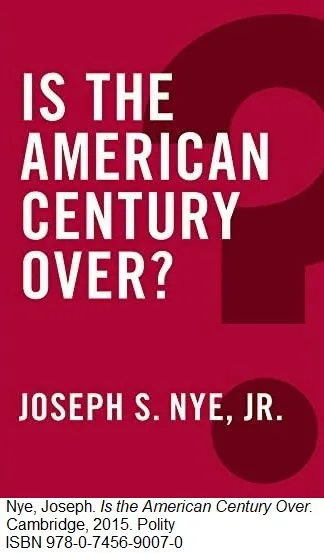Well, so much for a "detox from China." After finishing Sam Houston and the Alamo Avengers, I wasn't quite ready to dive into yet another heavy biography of Catherine the Great (and with most of my book collection still in China and little in terms of income, I was running out of options), so I decided to take a few afternoons to read this little morsel before putting on my sable and heading back into 18th century Russia. Can't say I regret reading it, but I had to groan at the irony of its timing.
A Familiar Face
Like Jonathan Fenby's Will China Dominate the 21st Century, which I reviewed some time ago, this book comes from the "Global Futures" series, a small collection of geopolitical forecast essays from the mid-2010's that seemed tailor-made to dispense with what is laughably called "conventional wisdom" in politics. Like the above-mentioned, it is a short, information-dense book that probably could use more citations than it includes, written by an economic expert. And like the above-mentioned, the book's conclusion is that conventional wisdom lacks wisdom.
It's The End of the World As We Know It...
I was a bit surprised (albeit pleasantly) by the fact that the author practically opens the book by saying the titular question itself is a stupid one, citing the fact that no two "experts" can quite agree on when exactly the 'American Century' began (p. 2 - 8). Dates ranging from 1914 (when New York became the World's leading financial center) to 1945 (when we emerged from WW2 as the first nation in history to account for more than half the GDP of the planet), and even as late as 1991 (when the fall of the USSR left us as the only Great Power left in the world, at least for a while) are put forth as the theoretical start of America's supposed "global empire."
The author is also quick to point out that "dominance" has never, for an instant, meant that the US managed to control the world. At the height of US relative power over a broken and shattered world (1945 - 1955), the US still saw the Republic of China fall to communists, followed by North Korea, and nearly by ALL of Korea (p. 12). In short, rather than ask "when will the American century end," Nye is quick to point out that in the sense of a global empire running everything in the world, such a century can't end because it never began.
Having pointed out that the question of "is the Pax Americana ending" is kind of a deluded one to ask, Nye goes on to point out WHY so many people are either rubbing their hands gleefully or wringing them anxiously, waiting for it to happen. An entire chapter of the book is devoted to pointing out that Americans have been convinced their country was on the brink of collapse since before it even existed.
Americans have a long history of worrying about their decline. Shortly after the founding of the Massachusetts Bay colony in the seventeenth century, some Puritans lamented a decline from earlier virtue. In the eighteenth century, the founding fathers focused on the history of Rome, and worried about the decline [from Republic to Empire]. In the nineteenth century, Charles Dickens observed that, if you listen to its citizens, America "is always depressed, is always stagnated, and always is in an alarming crisis, and never was otherwise." (p. 18 & 19)
Finally, having challenged the basis of the titular question and pointed out the foolishness that leads the wrong question to be asked in the first place, Nye goes on to point out that "decline" has multiple meanings,and they basically fall into "actual decline," meaning collapse, and "relative decline," which is where you're still growing but it looks like you're shrinking because everyone else is growing faster (p. 20). In other words, your 20 gram slice is a smaller percentage of today's 100 gram pie than your 10 gram slice was of the 20 gram pie the world ate yesterday, but you're still eating better than you did then.
By this point, the author has made clear that the implication in the title, namely "America has ruled the world up to this point but is now in decline" is open to challenges on both sides of the conjunction.
...And I Feel Fine!
The notion that America is facing the decline laid out in the first option, that is, "absolute decline," is put to the sword rather brutally and decisively.
Past culture battles over slavery, prohibition, McCarthyism, and civil rights were more serious than any of today's issues. People often attribute a golden glow to the past and that makes it easy to assert decay. (p. 73)
Most developed countries will experience a shortage of people as the century progresses, whereas the US Census Bureau projects that between 2010 and 2050, the American population will grow by 42 percent to 439 million. (p. 76)
A study by Shanghai Jiao Tong University places 17 of the top 20 universities in the US (and none in China). (p. 83)
The question of "is the US going to lose its place to a rival" gets much more attention though. In fact, a comparison between the US and most of the nations generally viewed as potential rivals, takes up most of its page, and China gets special attention among these rivals. Essentially, the author arrives at the conclusion that the US is still going to be the most powerful nation (in fact, Nye predicts that not even any foreseeable two-to-three nation coalition will be able to match the US by any measure without falling short of the US in some other), but not by such a margin that they'll be able to act without allies. The days when it was "there's us and there's the world and the world is the smaller of those two," have passed.
The American century is likely to continue for a number of decades at the very least, but it will look very different from how it did when Henry Luce first articulated it. (p. 127)
In essence, if the nations are government officials, Nye sees 21st century American leadership over the world as a Prime Minister with limits on its power, instead of a monarch whose word is unquestionable law.
Admittedly, the author seems to input so many disclaimers, so many "ifs" and "buts" that hang off of every statement he makes, that it is difficult to take either a yes or a no answer to the titular question without more than a grain or two of salt. Indeed, by starting off with the muddying of the question, he almost seems to make it deliberately unanswerable, though one gets the impression that this is the point.
So Who Should Read It?
Well, anyone who is even remotely interested in US politics or World Politics, really. Even if one does not agree with the (almost) conclusions Joseph Nye (almost) draws, the facts which (almost) led him to those conclusions are laid out rather plainly (note, there is no "almost" on that one). The book is not that long (I finished it in four sittings, and if I hadn't spent the week distracted that would've been one), and it's definitely eye-opening. Considering that social media is filled with knuckle-heads who love to argue politics in the most extreme terms possible, then a quick crash course in actual facts would benefit basically anyone in any political discussion by helping them not make such idiots of themselves.
...In other words, it's unlikely anyone will read it, since people seem to prefer being loud to being right.

